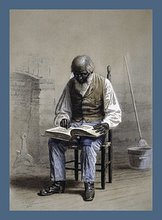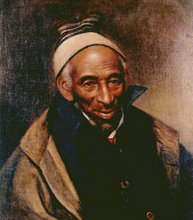Excerpts from Martin Luther King's Where Do We Go From Here: Chaos or Community continued on the issue of the stalling of the civil rights movement in the face of rising white resistance in the mid-1960s:
Meanwhile frustration and a loss of confidence in white power have engendered among many Negroes a response that is essentially a loss of confidence in themselves. They are failing to appreciate two important facts.
First, the line of progress is never straight.... The inevitable counterrevolution that succeeds every period of progress is taking place. Failing to understand that this is a normal process of development, some Negroes are falling into unjustified pessimism and despair. Focusing on the ultimate goal, and discovering it still distant, they declare no progress at all has been made.
This mood illustrates another fact that has been misinterpreted. A final victory is an accumulation of many short-term encounters. To lightly dismiss a success because it does not usher in a complete order of justice is to fail to comprehend the process of achieving ful lvictory. It underestimates the value of confrontation and dissolves the confidence born of a partial victory by which new efforts are empowered.
...
[The Regional Issue]
The struggles of the past decadewere not national in scope; they were southern; they were specifically designed to change life in the South; and the principal role in the North was supportive. It would be a serious error to misconstrue the movement's strategy by measuring northern accomplishments when virtually alll programs were applied in the South and sought remedies applicable solely to it.
...The South was the stronghold of racism. In the white migration s through history from the South to the North and West, racism was carried to poison the rest of the nation. ...
Civil rights leaders had long thought the North would benefit derivatively from the southern struggle. They assumed that without massive upheavals certain systemic changes were inevitable as the whole nation reexamined and searched its conscience. This was a miscalculation. It was founded on the belief that opposition in the North was not intrasigent, that it was flexible and was, if not fully, at least partially hospitable to corrective influences. We forgot what knew daily in the South: freedom is not given, it is won. Concentration of effort in the large northern cities can no longer be postponed in favor of southern campaigns. Both must now be sustained. [emphasis added]
In assessing the results of the Negro revolution so far, it can be concluded that Negroes have established a foothold, no more. We have written a declaration of independence, itself an accomplishment, but the effort to transform the words into a life experience still lies ahead.
The hard truth is that neither Negro nor white has yet done enough to expect the dawn of a new day. While much has been done, it has been accomplished by too few and on a scale too limited for the breadth of the goal: Freedom is not won by a passive acceptance of suffering. Freedom is won in the struggle against suffering. By this measure, Negroes have not yet paid the full price of freedom. And whites have not yet faced the full cost of justice....
No great victories are won in a war for the transformation of a whole people without total participation.... Negroes hold one key to the double lock of peaceful change. The other is in the hands of the white community.
[In recounting the emergence of the Black Power slogan during the Meredith march, King states:]
I guess I should not have been surprised. I should have known that in an atmosphere where false promises are daily realities, where deferred dreams are nightly facts, where acts of unpunished violence toward Negroes are a way of life, nonviolence would eventually be seriously questioned. I should have been reminded that disappointment produces despair and despair produces blindness, and that the one certain thing about bitterness is its blindness. Bitterness has not the capacity to make the distinction between some and all. When some members of the dominant group, particularly those in power, are racist in attitude and practice, bitterness accuses the whole group....
I tried to make it clear that besides opposing violence on principle, I could imagine nothing more impractical and disastrous than for any of us, through misguided judgment, to precipitate a violent confrontation in Mississippi. We had neither the resources nor the techniques to win....
Next the question of the participation of whites was raised. Stokely Carmichael contended that the inclusion of whites in the march should be de-emphasized and that the dominant appeal should be for black participation....
I surmised that much of the change had its psychological roots in the experience of SNCC in Mississippi during the summer of 1964, when a large number of northern white students had come down to help in that racially torn state. What the SNCC workers saw was the most articulate, powerful and self-assured young white people coming to work with the poorest of the Negro people--and simply overwhelming them. That summer Stokely andn others in SNCC had probably unconsciously condcluded that this was no good for Negores, because it simply increased their sense of their own inadequacies. Of course, the answer to this dilemma was not to give up, notto conclude that blacks must work with blacks in order for Negroes to gain a sense of their own meaning. The answer was only to be found in persistent trying, perpetual experimentation, persevering togetherness.
Like life, racial understanding is not something that we find but something that we must create.
...
So Greenwood turned out to be the arena for the birth of the Black Power slogan in the civil rights movement. The phrase had been used long before by Richard Wright andothers, but never until that night had it been used as a slogan in the civil rights movement....
First it is necessary to understand that Black Power is a cry of disappointment. The Black Power slogan did not spring full grown from the head of some philosophical Zeus. It was born from the wounds of despair and disappointment. It is a cry of daily hurt and persistent pain. For centuries the Negro has been caught in the tentacles of white power. Many Negroes have given up faith in the white majority because "white power" with total contral has left them empty-handed. So in reality the call for Black Power is a reaction to the failure of white power.
It is no accident that the birth of this slogan in the civil rights movement took place in Mississippi--the state symbolizing the most blatant abuse of white power. In Mississippi the murder of civil rights workers is still a popular pasttime. In that stare more than forty Negroes and whites have either been lynched or murdered over the last three years, and not a single man has been punished for these crimes. More than fifty Negro churches have been burned or bombed in Mississippi in the last two years, yet the bombers still walk the streets surrounded by the halo of adoration. This is white power in its most brutal, cold-blooded and vicious form.
I wil comment and report excerpts at a later time on King's critique in Where Do We Go From Here? of black power as a slogan and goal. The purpose of this blog was to report the way in which King squarely lays the blame for the rise of the black power slogan and its subsequent domination to the resistance of white society and phenomenally in the intersection of increased white resistance and the point at which the movement had to go to a new stage to seek practical equality and the payments on both sides would be higher and require the participation of all.
Subscribe to:
Post Comments (Atom)



No comments:
Post a Comment